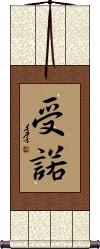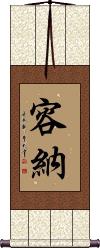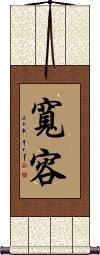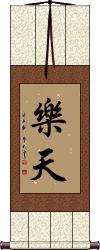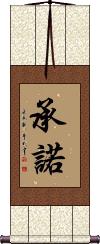Many custom options...
And formats...

Acceptance in Chinese / Japanese...
Buy an Acceptance calligraphy wall scroll here!
Personalize your custom “Acceptance” project by clicking the button next to your favorite “Acceptance” title below...
Acceptance
受諾 is a simple Japanese word for acceptance.
Because it's a general term, it can mean acceptance in a lot of different contexts (acceptance of your friends, family, differences, faults, etc.).
Acceptance / Tolerate
容納 speaks of being tolerant of other opinions or being accepting of other people's ideas or ways of doing things.
Other definitions of this word include having the capacity for, to accommodate, or to tolerate.
Tolerance
Being tolerant is accepting differences. You don't expect others to think, look, speak or act just like you. You are free of prejudice, knowing that all people have feelings, needs, hopes, and dreams. Tolerance is also accepting things you wish were different with patience and flexibility.
寬容 can also be translated as magnanimity, generosity, or leniency.
Note: There is a tiny deviation in the first character when written in Japanese. If you choose our Japanese master calligrapher, the little dot on the lower right of the first character will be omitted. With or without the dot, this can be read in Chinese, Japanese, and old Korean.
See Also: Patience
Optimism / Happy With Your Fate
樂天 is about being optimistic and also making the best of whatever life throws at you.
This is hard to define. One dictionary defines this as “acceptance of fate and happy about it.” There is one English word equivalent, which is sanguinity or sanguinary.
You can also say that this means “Be happy with whatever Heaven provides,” or “Find happiness in whatever fate Heaven bestows upon you.” 樂天 suggests being an optimist in life.
Note: This is sometimes a given name in China.
![]() Please note that Japanese tend to write the first character in a slightly-different form (as seen to the right). Let us know if you have a preference when you place your order.
Please note that Japanese tend to write the first character in a slightly-different form (as seen to the right). Let us know if you have a preference when you place your order.
Commitment
承諾 embodies the idea of commitment but also means to make a big effort or to undertake a great task.
Commitment is caring deeply about something or someone. It is deciding carefully what you want to do and then giving it 100%, holding nothing back. You give your all to a friendship, a task, or something you believe in. You finish what you start. You keep your promises.
In Chinese, this word directly means to undertake something or to make a promise to do something.
Outside of the commitment idea, this particular word can also mean approval, acceptance, consent, assent, acquiescence, or agreement, depending on context (especially in Japanese and Korean). Therefore, this word is probably best if your audience is Chinese.
See Also: Partnership | Hard Work | Dedication
This in-stock artwork might be what you are looking for, and ships right away...
Gallery Price: $61.00
Your Price: $33.88
Not the results for acceptance that you were looking for?
Below are some entries from our dictionary that may match your acceptance search...
| Characters If shown, 2nd row is Simp. Chinese |
Pronunciation Romanization |
Simple Dictionary Definition |
任 see styles |
rèn ren4 jen makoto まこと |
to assign; to appoint; to take up a post; office; responsibility; to let; to allow; to give free rein to; no matter (how, what etc); classifier for terms served in office, or for spouses, girlfriends etc (as in 前任男友) obligation; duty; charge; responsibility; (given name) Makoto Bear, endure, let; office; it is used to connote laisser-faire; one of the 四病, as 任運 implies laisser-aller; it is intp. by let things follow their own course, or by 自然 naturally, without intervention. |
受諾 see styles |
judaku じゅだく |
More info & calligraphy: Acceptance |
承諾 承诺 see styles |
chéng nuò cheng2 nuo4 ch`eng no cheng no shoudaku / shodaku しょうだく |
More info & calligraphy: Commitment(noun, transitive verb) (ant: 拒否) consent; approval; acceptance; agreement; compliance |
也罷 也罢 see styles |
yě bà ye3 ba4 yeh pa |
(reduplicated) whether... or...; never mind; fine (indicating acceptance or resignation) |
了承 see styles |
ryoushou / ryosho りょうしょう |
(noun/participle) acknowledgement; acknowledgment; understanding (e.g. "please be understanding of the mess during our renovation"); noting; acceptance |
信受 see styles |
xìn shòu xin4 shou4 hsin shou shinju しんじゅ |
(noun/participle) belief; acceptance (of truths) The receptivity and obedience of faith; to believe and receive (the doctrine). |
信認 see styles |
shinnin しんにん |
(noun/participle) acknowledge; acceptance; admission |
倍率 see styles |
bèi lǜ bei4 lu:4 pei lü bairitsu ばいりつ |
(optics) magnifying power (1) magnification; leverage; amplification; scaling factor; scale factor; (2) (25% acceptance would be a 倍率 of 4) competitiveness rating (e.g. for university entrance); applicant-to-acceptance ratio |
受付 see styles |
uketsuke うけつけ |
(1) reception (desk); information desk; (noun/participle) (2) receipt; acceptance |
受入 see styles |
ukeire / ukere うけいれ |
(irregular okurigana usage) receiving; acceptance; reception |
受理 see styles |
shòu lǐ shou4 li3 shou li juri じゅり |
to accept to hear a case; to handle (a service) (noun, transitive verb) acceptance |
受納 受纳 see styles |
shòu nà shou4 na4 shou na junou / juno じゅのう |
to accept; to receive (tribute) (noun, transitive verb) acceptance; receiving |
圓教 圆教 see styles |
yuán jiào yuan2 jiao4 yüan chiao engyō |
The complete, perfect, or comprehensive doctrine; the school or sect of Mahāyāna which represents it. The term has had three references. The first was by 光統 Guangtong of the Later Wei, sixth century, who defined three schools, 漸 gradual, 頓 immediate, and 圓 inclusive or complete. The Tiantai called its fourth section the inclusive, complete, or perfect teaching 圓, the other three being 三藏 Hīnayāna, 通 Mahāyāna-cum-Hīnayāna, 別 Mahāyāna. The Huayan so called its fifth section, i.e. 小乘; 大乘始; 大乘終; 頓 and 圓. It is the Tiantai version that is in general acceptance, defined as a perfect whole and as complete in its parts; for the whole is the absolute and its parts are therefore the absolute; the two may be called noumenon and phenomenon, or 空 and 假 (or 俗), but in reality they are one, i.e. the 中 medial condition. To conceive these three as a whole is the Tiantai inclusive or 'perfect' doctrine. The Huayan 'perfect' doctrine also taught that unity and differentiation, or absolute and relative, were one, a similar doctrine to that of the identity of contraries. In Tiantai teaching the harmony is due to its underlying unity; its completeness to the permeation of this unity in all phenomena; these two are united in the medial 中 principle; to comprehend these three principles at one and the same time is the complete, all-containing, or 'perfect' doctrine of Tiantai. There are other definitions of the all-inclusive doctrine, e.g. the eight complete things, complete in teaching, principles, knowledge, etc. 圓教四門 v. 四門. |
妄信 see styles |
moushin / moshin もうしん boushin / boshin ぼうしん |
(noun/participle) blind acceptance; blind belief; credulity |
容共 see styles |
youkyou / yokyo ようきょう |
(ant: 反共) pro-communism; acceptance of communism |
引受 see styles |
hikiuke ひきうけ |
undertaking; underwriting; acceptance |
承允 see styles |
shouin / shoin しょういん |
(noun, transitive verb) (archaism) consent; acceptance; agreement |
承引 see styles |
shouin / shoin しょういん |
(noun, transitive verb) (form) consent; acceptance; agreement |
承知 see styles |
shouchi / shochi しょうち |
(noun, transitive verb) (1) knowledge; awareness; (noun, transitive verb) (2) acceptance; consent; assent; agreement; compliance; acknowledgment; acknowledgement; (noun, transitive verb) (3) (usu. in the negative) forgiving; pardoning; excusing |
採用 采用 see styles |
cǎi yòng cai3 yong4 ts`ai yung tsai yung saiyou / saiyo さいよう |
to adopt; to employ; to use (noun, transitive verb) (1) use; adoption; acceptance; (noun, transitive verb) (2) appointment; employment; engagement; recruitment |
採納 采纳 see styles |
cǎi nà cai3 na4 ts`ai na tsai na sainou / saino さいのう |
to accept; to adopt (noun, transitive verb) adoption (e.g. of a proposal); acceptance |
接受 see styles |
jiē shòu jie1 shou4 chieh shou setsuju せつじゅ |
to accept (a suggestion, punishment, bribe etc); to acquiesce (noun, transitive verb) receipt; reception; acceptance |
推動 推动 see styles |
tuī dòng tui1 dong4 t`ui tung tui tung |
to push (e.g. for acceptance of a plan); to promote; to give impetus to |
検収 see styles |
kenshuu / kenshu けんしゅう |
(noun, transitive verb) acceptance inspection; collating; receipt and inspection |
歸戒 归戒 see styles |
guī jiè gui1 jie4 kuei chieh kikai |
acceptance of the precepts |
甘え see styles |
amae あまえ |
(See 甘える・あまえる・2) overdependence (on others; usu. one's fosterers or seniors); lack of self-reliance; presumed acceptance (of one's behaviour); presumed benevolence; attention-seeking (behavior) |
盲信 see styles |
moushin / moshin もうしん |
(noun/participle) blind acceptance; blind belief; credulity |
笑納 笑纳 see styles |
xiào nà xiao4 na4 hsiao na shounou / shono しょうのう |
to kindly accept (an offering) (noun, transitive verb) (humble language) (referring to acceptance of one's gift) (See ご笑納,つまらない物ですが) please accept (this) |
納受 纳受 see styles |
nà shòu na4 shou4 na shou nouju / noju のうじゅ |
(noun, transitive verb) acceptance; reception 納得 To receive, accept. |
納得 纳得 see styles |
nà dé na4 de2 na te nattoku なっとく |
(n,vs,vt,vi) (1) consent; agreement; acceptance; (n,vs,vt,vi) (2) understanding; satisfaction (e.g. with an explanation); being convinced to internalize |
Click here for more acceptance results from our dictionary
The following table may be helpful for those studying Chinese or Japanese...
| Title | Characters | Romaji (Romanized Japanese) | Various forms of Romanized Chinese | |
| Acceptance | 受諾 | judaku | ||
| Acceptance Tolerate | 容納 容纳 | róng nà / rong2 na4 / rong na / rongna | jung na / jungna | |
| Tolerance | 寬容 宽容 | kanyou / kanyo | kuān róng kuan1 rong2 kuan rong kuanrong | k`uan jung kuanjung kuan jung |
| Optimism Happy With Your Fate | 樂天 / 楽天 乐天 | raku ten / rakuten | lè tiān / le4 tian1 / le tian / letian | le t`ien / letien / le tien |
| Commitment | 承諾 承诺 | shoudaku / shodaku | chéng nuò cheng2 nuo4 cheng nuo chengnuo | ch`eng no chengno cheng no |
| In some entries above you will see that characters have different versions above and below a line. In these cases, the characters above the line are Traditional Chinese, while the ones below are Simplified Chinese. | ||||
Successful Chinese Character and Japanese Kanji calligraphy searches within the last few hours...
